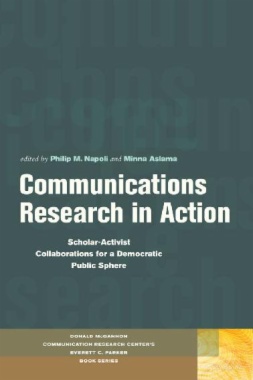A synergy between academia and activism has long been a goal of both scholars and advocacy organizations in communications research. The essays in Communications Research in Action demonstrate, for the first time in one volume, how an effective partnership between the two can contribute to a more democratic public sphere by helping to break down the digital divide to allow greater access to critical technologies, democratizing the corporate ownership of the media industry, and offering myriad opportunities for varied articulation of individuals’ ideas.
Essays spanning topics such as the effect of ownership concentration on children’s television programming, the media’s impact on community building, and the global consequences of communications research will not only be valuable to scholars, activists, and media policy makers but will also be instrumental in serving as a template for further exploration in collaboration.
- Cover
- Contents
- Foreword
- Acknowledgments
- Introduction
- PART I: EXPLORATIONS OF MOVEMENT ACTORS: STRATEGIES, IMPACTS, AND NEEDS
- 1. Digital Inclusion: Working Both Sides of the Equation
- 2. Engaging in Scholar-Activist Communications in Canada
- 3. Toward a Taxonomy for Public Interest Communications Infrastructure
- PART II: MEDIA OWNERSHIP: BRIDGING RESEARCH AND REGULATION
- 4. Big Media, Little Kids: The Impact of Ownership Concentration on the Availability of Television Programming for Children
- 5. Minority Commercial Radio Ownership: Assessing FCC Licensing and Consolidation Policies
- 6. Cross-Ownership, Markets, and Content on Local TV News
- PART III: ALTERNATIVE AND COMMUNITY MEDIA: DISCOVERING NEEDS AND OPPORTUNITIES
- 7. Measuring Community Radio's Impact: Lessons on Collaboration
- 8. Youth Channel All-City: Mapping the Media Needs and Interests of Urban Youth
- 9. Mobile Voices: Projecting the Voices of Immigrant Workers by Appropriating Mobile Phones for Popular Communication
- 10. Community Connect: A Network of Civic Spaces for Public Communication in North Dakota
- PART IV: COMMUNICATIONS INFRASTRUCTURE: RETHINKING RIGHTS
- 11. Telecommunications Convergence and Consumer Rights in Brazil
- 12. Citizen Political Enfranchisement and Information Access: Telecommunications Services in Rural and Remote Areas
- 13. Open Access in Africa: The Case of Mauritius
- 14. Public FM Project: Supporting the Licensing of New Noncommercial FM Radio Stations for Student and Community Usage
- PART V: ASSESSMENT: CREATING SUPPORT FOR SCHOLAR-ACTIVIST COLLABORATION
- 15. Cultures of Collaboration in Media Research
- 16. Engendering Scholar-Activist Collaborations: An Evaluator's Perspective
- Conclusion: Bridging Gaps, Crossing Boundaries
- List of Contributors
- Index

